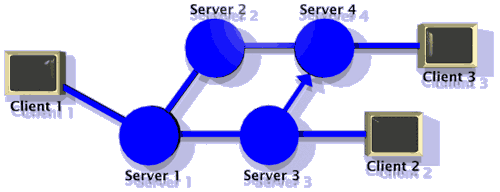The program you use to access news articles, your news reader, is a client. Clients sit at the edges of the system that delivers news across the world. The systems that form the network in between are the servers. Each server is connected to one or more others which are its peers. In the diagram below Server 1 has peers Server 2 and Server 3.
The servers are connected together by various links, some fast, others slow. Some carry all the newsgroups, others might only carry a selection. Some links might only work in one direction, or only send on articles originating on that server. The link between Server 3 and Server 4 is an example.

News articles are propagated by a simple process called store and forward. When a server receives and article it first checks if it already has a copy. If not it stores the article for its clients to read, and forwards a copy to other servers that might not have it.
If Client 1 posts a new article it goes to Server 1 first. Server 1 forwards a copy onto Servers 2 and 3. Server 4 will be the last to receive a copy as it has to wait for Server 2 to pass it on (Server 3 has been set up not to forward articles from Server 1 to Server 4).
If Client 2 posts a follow-up to the original article soon after it arrives then this post will be forwarded by Server 3 to Servers 1 and 4. Its perfectly possible that this reply will reach Server 4 before the original article. For a while Client 3 will see the reply, but not the original post. This happens surprisingly often.
The volume of data generated by all the users on all the newsgroups is huge, hundreds of Gigabytes each day. Servers cannot keep every article forever so old articles are periodically expired. The expiry times will vary from server to server , and from group to group. A article from a binary group may only be kept a day or two, while important articles in the news.* hierarchy may be kept for a month or more.
If the date and time on your system are not set correctly then you may find that your posts are expired very quickly (if your clock is slow) or ignored completely. If you are in the habit of changing your computer clock to allow repeated use of time-limited demo software, you will also need to get in the habit of setting it back before posting!
News servers, and the links between them can and do fail. When this happens the articles often propagate by more roundabout routes, increasing the likelihood of seeing replies before original articles. Occasionally a server or a group of servers will become isolated from the rest of the network, and things will become quieter than normal. If the fault is corrected quickly (before the articles expire) then the backed-up articles get delivered in a flood.
If you need to contact the news administrator about problems
then they will typically have set up a mail account called
news, or usenet. Don't pester them
unless you have a major problem though: they are typically
busy people, and news propogation is often a low priority.